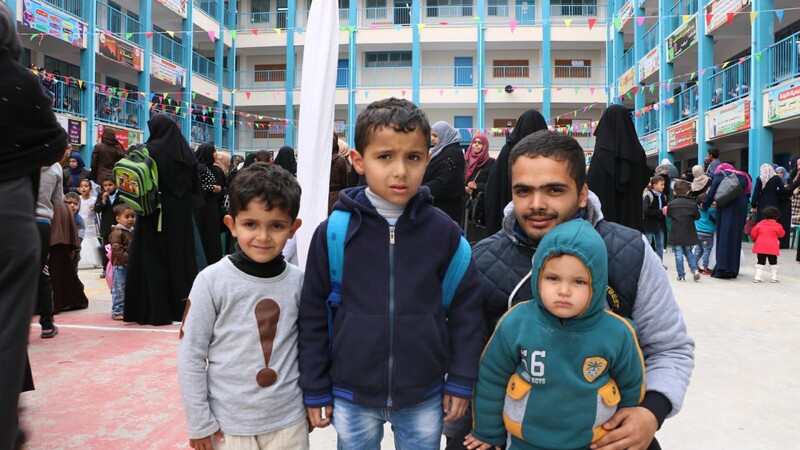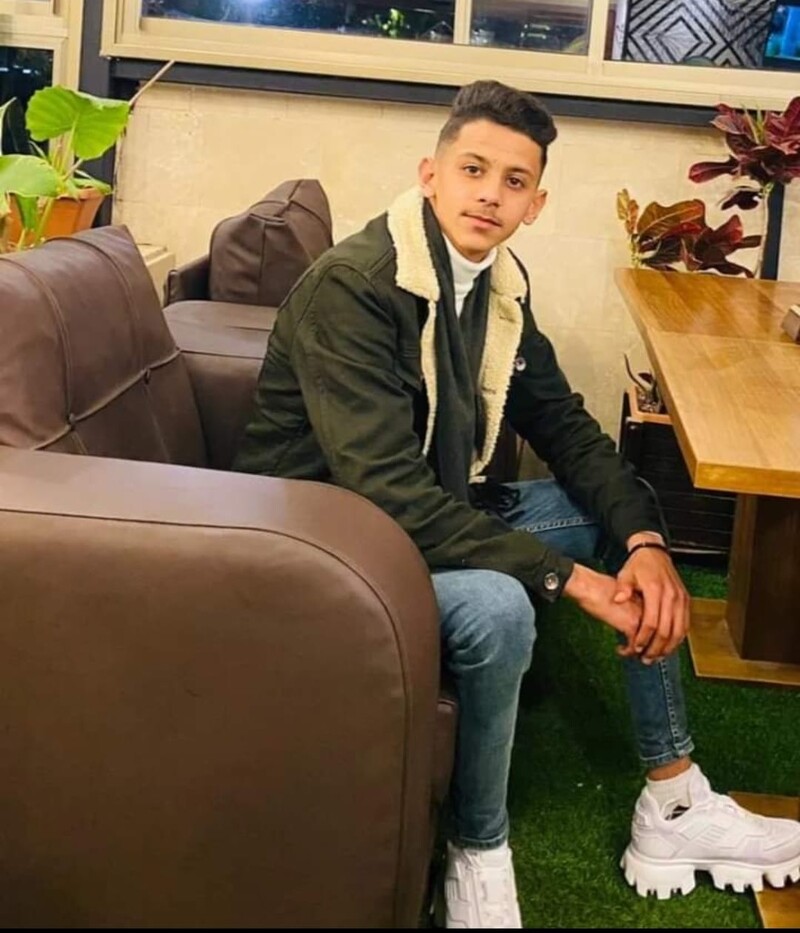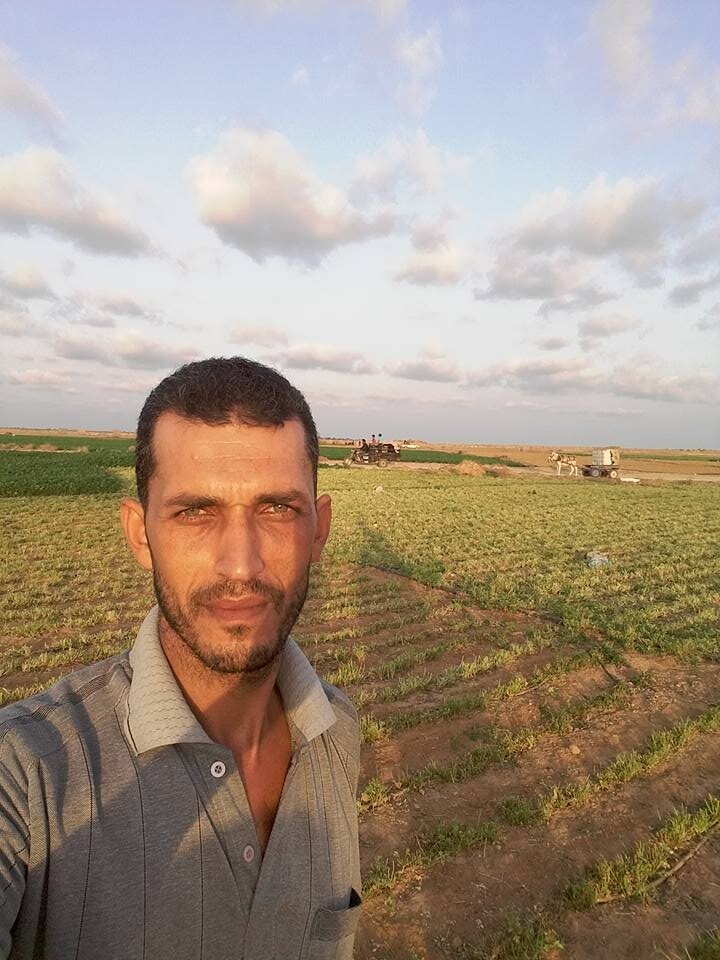The Electronic Intifada 2 January 2024

Mahmoud Akel with his nephews, from left to right, Soleman and Abdallah, and his son in his lap. This photo was taken in February 2018, before Mahmoud was killed by Israel in the Great March of Return that same year.
I do not have childhood memories connecting me to my homeland of Palestine. That is because I grew up in a lot of different places.
My father worked as an agricultural engineer, and we moved from home to home. I spent most of my childhood in Saudi Arabia.
As a teenager, I returned to Gaza, to the village of Abasan al-Jadida (al-Saghira). It’s located near the eastern boundary of the Khan Younis governorate.
It’s home to about 1,600 families.
In this small village, where I lived for 24 years, I made friends. I became a part of Gaza, and Gaza became a part of me.
I lived through the previous wars together with my family and friends, starting from the 2008 war, through the 2012 war, and up to the 2014 war, which I experienced with its difficult circumstances, lasting 51 days under continuous bombardment.
I also experienced the Great March of Return, especially since part of it was happening near the family home, which was only a few hundred meters away from the eastern boundary with Israel.
I moved out of Gaza in 2018. Today, I live in Belgium.
Although I have the safety that my family lacks and that every person in Gaza lacks, fear and anxiety still haunt me. Despite the thousands of miles separating me from my family, and despite being safe from the treacherous bombings of Israeli aircrafts, the feeling of fear never leaves me.
I want to tell you the stories of both my family and the martyrs of my village in this war. I want to tell you about the pain that sometimes makes breathing difficult.
Wissam al-Daghma
I will start with Wissam al-Daghma. He was 18 years old, almost out of childhood.
But he still had the enthusiasm of a child.
I’m starting with his death because it was the first shock to our village.
His mother Fatima married the man she loved, Rihan. He was the most handsome man in the village.
They were such an attractive couple, and they were happy in their marriage.
Yet they faced difficulties in conceiving a child. Fatima experienced several miscarriages and six failed attempts at assisted fertilization.
The couple did not give up. The wife knew deep down that she would have a son.
In the eighth year of her marriage, she gave birth to the twins Wissam and Gharam. A melodious pair of names.

Wissam al-Daghma was 18 when he was killed by an Israeli airstrike in Khan Younis.
Wissam means “handsome” in English, and Gharam means “passion.” He had his father’s eyes. He was the beloved child of the village. He was full of love and faith, a top student in his class.
On 7 October, everyone knew that this war was unlike any previous war. People were already preparing to leave the north.
Israel dropped flyers from the sky telling people to evacuate.
The al-Daghma family rented an apartment in the west of the Khan Younis governorate and felt fortunate. Most families couldn’t find a place to take refuge.
Some stayed at schools run by the UN agency for Palestine refugees (UNRWA), while others were stuck outside or forced to go to hospitals.
Wissam and his father Rihan were standing at the door of their apartment building. Then, an Israeli airstrike targeted the area, and Wissam was killed. Rihan survived, and was full of anguish.
Wissam al-Daghma was martyred. He will not explore the world, study in college, marry or become a father.
His twin Gharam is alive, but she will never be whole without her twin.
Muhammad Abu Latifa
That day in Khan Younis, Rihan saw another person martyred by Israel. His friend and neighbor Muhammad Abu Latifa.
He was a father of four and had dreamed for many years of making a life outside of Gaza, to earn a better income.
Muhammad had worked as a driver, shuttling students from Khan Yunis to the university in Gaza City.
For a brief period, he moved to Turkey with his family, but the cost of living was too high there, and the family returned to Gaza.
The family tried to migrate without documents to Europe, via boat. His wife and daughters had made it, and he had planned to follow.

Muhammad Abu Latifa was a father of four. He was killed by an Israeli airstrike in Khan Younis.
Days before the war started, Muhammad had applied for visas for himself and his remaining children to go to Turkey. They evacuated the east of Khan Younis for the west.
They were staying at an UNRWA school.
Muhammad had been visiting with Wissam and Rihan when the Israeli airstrike hit. Rihan said he saw Abu Latifa explode in front of him.
In the first week of the war, Israel killed so many from my village.
Imran and Hamam Abu Taima. Hamam’s body was not found at first. He was in the mortuary at the Nasser Medical Complex in Khan Younis.
He was identified by his keychain, now charred, in his pocket. His face was unrecognizable.
Dr. Rani Muammar, who was our village’s doctor, and his wife and their four children were killed in an Israeli airstrike.
He obtained his medical degree in Donetsk, Ukraine, and he opened a clinic in our village.
At the start of the war, he evacuated with his family to Rafah, in Gaza’s south. But it was not safe there either.
They are not numbers or names. They are souls and stories.
Before the war, more deaths
Before this war, so many have died.
My cousin Amar died while trying to migrate to Greece. He had been traveling to Greece by boat from Turkey.
Those who were with him said that he died swimming against the current, caught in the boat’s motor blades.
In my opinion, the Israeli occupation killed him and the many others who have tried to get out of Gaza.
He should not be forgotten.
The painful thing is that my aunt still does not know that her son died. She believes that he is in prison for migrating without documentation.
She still asks me, “When will I hear news from my son?”
I say, “Soon, God willing.”
My friend’s son Abdullah Jaber Abu Taima died by suicide four months ago. He was impoverished, due to the Israeli siege, and he had felt there were no opportunities in life.
He, too, should not be forgotten.
My brother Mahmoud. He was killed by Israel in the Great March of Return in 2018.
He left behind his wife and two young children, aged 7 and 6.
In Abasan al-Jadida, Israel has killed at least 50 of us. The occupation is a machine that writes and rewrites our destinies.
This is under the pretext that we are not human, not worthy of life.
I want these individuals to be immortalized. I want to tell the world that they had dreams of a better life.
Nawal Soleman Akel is a student of political science living in Belgium.


